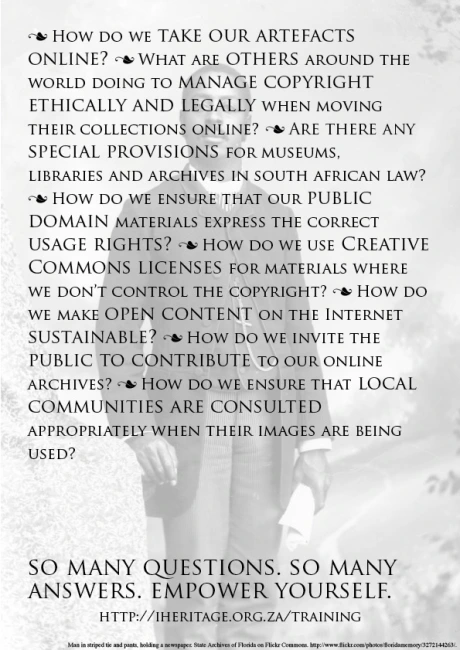More digital tools for promoting access in the United States August 13, 2009
Posted by Heather Ford in Tools.add a comment
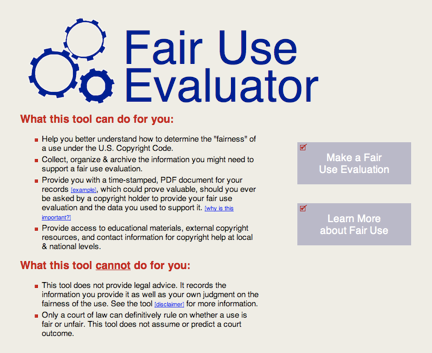 Two more great copyright tools from Michael Brewer are the Fair Use Evaluator and the Exceptions for Instructors eTool. The Fair Use Evaluator enables librarians and educators to collect, organize and archive the information they might need to support a fair use evaluation in the United States. It also provides the user with a time-stamped PDF document for their records describing how they made the fair use decision (users are able to give arguments about fair use similarly to how they do this in the Wikipedia project). The Exceptions for Instructors eTool ‘guides users through the educational exceptions in U.S. copyright law, helping to explain and clarify rights and responsibilities for the performance and display of copyrighted content in traditional, distance and blended educational models’ (librarycopyright.net).
Two more great copyright tools from Michael Brewer are the Fair Use Evaluator and the Exceptions for Instructors eTool. The Fair Use Evaluator enables librarians and educators to collect, organize and archive the information they might need to support a fair use evaluation in the United States. It also provides the user with a time-stamped PDF document for their records describing how they made the fair use decision (users are able to give arguments about fair use similarly to how they do this in the Wikipedia project). The Exceptions for Instructors eTool ‘guides users through the educational exceptions in U.S. copyright law, helping to explain and clarify rights and responsibilities for the performance and display of copyrighted content in traditional, distance and blended educational models’ (librarycopyright.net).
This can’t currently be used for South African fair dealing cases, but it would be wonderful if we could see it localised.
‘Copyright and digitisation’ course kicks off in Durban May 6, 2009
Posted by Heather Ford in Features.Tags: copyright, training
4 comments
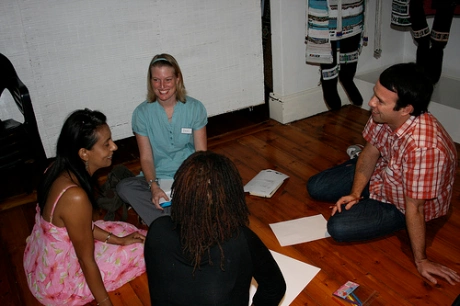
Ramika Pillay, Desre Stead, Niall McNulty and Rose Mokhosi discuss the world's most important artefact. Pic by niallmcnulty on Flickr. CC BY-NC
Most participants at the April ‘Copyright, digitisation and access‘ seminar agreed that being in position to now develop their own copyright strategy was probably the most important outcome of the short course.
Starting off with a look at current trends in online sharing of heritage, we then went to carefully examine the copyright tools that are available to librarians and archivists to enable them to make their artefacts accessible online. The end result was the beginning of a strategy that each organisation could employ that examines who the stakeholders are, what best case practice is for sharing artefacts with creators and custodians, how to implement Creative Commons licenses and use other free online tools, and what steps to employ in order to successfully develop an inventory of open content within the online archive.
I was really lucky to have started the course with such a special group of people. Every one of the participants is so passionate about their work, and asked such great questions, that it really didn’t seem like work at all!
We received some great feedback from participants. Everyone who gave feedback said that they would recommend the course to others, and that they would implement things like the in-house copyright strategy, Creative Commons licenses, and call for greater transparency and further steps to protect copyright holders’ rights within their organisations.
The participants have joined a mailing list where they are able to post interesting news about their projects and ask questions of other participants. Future participants will join this group so that there is ongoing support as copyright strategies are implemented in the months to come.
A huge thank you from iHeritage and the African Commons Project to those who participated in the workshop. We look forward to hearing more as you implement your strategies!
Tomorrow’s seminar: sustainability of online heritage projects April 6, 2009
Posted by Heather Ford in Announcements.Tags: business models, iheritage seminars, sustainability
add a comment
Tomorrow is the final iHeritage seminar hosted by the African Commons Project and will look at sustainability issues for heritage projects going online. We’ll look at examples of how other organisations are funding such initiatives, what kinds of partnerships make sense and what value propositions mean in the online world.
Sue Hadcroft from Africa Media Online is flying up from Maritzburg to present her company’s Memat software and discuss some of the sustainability plans that they are working on. This will be a great opportunity to ask questions and understand the online heritage sustainability question better.
RSVPs are still open until the end of the day.
A new course on copyright and access for South African heritage institutions March 23, 2009
Posted by Heather Ford in Announcements.Tags: copyright, training
add a comment
Registration for training in Durban closes this Friday. Make sure you book your place!
This Week’s Hidden Gem March 12, 2009
Posted by Rebecca Kahn in Features, Hidden Gem.Tags: Hidden Gem, Internet Archive, radio broadcast
add a comment
This month we have a real hidden gem – an old radio serial from the 1930s, which we found in the vast audio archives at the Internet Archive.
Not much is known about the radio series Moon Over Africa. It is thought to be a South African radio show which aired around 1937 or 1938. There are 26 episodes lasting 15 minutes each. Since nothing is really known about the series we are not sure if there were episodes which aired before, or after, these 26 episodes. The 26 episodes follow an expedition led by Professor Anton Edwards as they search for the missing city of Atlantis. They follow the directions of a shrunken head which speaks the ancient language of the people of Atlantis and run into many strange dangers in the African jungle.
It’s a real Boy’s Own Adventure story, a swashbuckler straight out of H Rider Haggard. If you’d like to hear the other 25 episodes in this epic tale of love, adventure and danger, you can download them from the Internet Archive here. They’re licensed under a Creative Commons Attribution-Noncommercial-NoDerivatives license, so you’re free to download and share them.
This radio broadcast is old, and a throwback to another era, when people thought differently about Africa and it’s people. But we can’t discount its historical value, as a piece of ephemera from another time. The ideas in this broadcast are in no way a reflection of the principles or values of the iHeritage project.
iHeritage Seminar, 3rd March 2009 – Tools for Cultural Heritage Organisations March 10, 2009
Posted by Rebecca Kahn in Announcements.Tags: iheritage seminars
add a comment
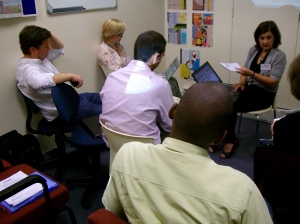
Participants at the 2nd iHeritage seminar
Last week’s seminar on Tools for Cultural Heritage Organisations was a great success.You can read about the seminar here, or download Heather Ford’s presentation here and we’ll be uploading video of the session soon.
Many thanks to everyone who attended the seminar and shared their experiences with us.
The next iHeritage seminar will be held on the 9th of April and will be exploring new sustainability models for the heritage industry. For more information, please email rosanne@africancommons.org
iHeritage seminar on software tools: Tuesday 3 March February 27, 2009
Posted by Heather Ford in Announcements.Tags: iheritage seminars
add a comment
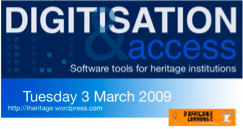 Remember to RSVP soonest for the iHeritage seminar on Tuesday. We’re inviting educators, creators, archivists and curators to join us for tea and coffee, 10am – 1pm at our Rosebank, Johannesburg offices to discuss technology choices available for sharing heritage online. We’re not only going to be looking at software specifically created for museums, but also at easy-to-maintain online tools like Flickr that enable anyone to easily publish their materials while having the tech taken care of by third parties. If you’re interested in how how culture and memory is being curated and collected online, be sure to join us on Tuesday. See the events page for more and RSVP Rosanne if you’d like to attend.
Remember to RSVP soonest for the iHeritage seminar on Tuesday. We’re inviting educators, creators, archivists and curators to join us for tea and coffee, 10am – 1pm at our Rosebank, Johannesburg offices to discuss technology choices available for sharing heritage online. We’re not only going to be looking at software specifically created for museums, but also at easy-to-maintain online tools like Flickr that enable anyone to easily publish their materials while having the tech taken care of by third parties. If you’re interested in how how culture and memory is being curated and collected online, be sure to join us on Tuesday. See the events page for more and RSVP Rosanne if you’d like to attend.
This Week’s Hidden Gem February 20, 2009
Posted by Rebecca Kahn in Hidden Gem.Tags: heritage, Internet Archive, SA music, South Africa
add a comment
This week’s Hidden Gem is an audio file which has been lurking in the Internet Archive‘s vast open source audio repository. It’s a wonderful recording by National Public Radio’s Afropop Worldwide show, and was made to celebrate South African music and culture, particularly of the period during the transition to democracy.
Veterans of contemporary SA music including Lucky Dube, Ray Phiri, Dorothy Masuka, and others are interviewed and they share their recollections of the key events of the apartheid era and the long journey to freedom: the June 16th 1976 Soweto Student Uprising, the February 11th 1990 release from jail of Nelson Mandela; the April 27th 1994 first democratic elections for the New South Africa. Younger stars of kwaito music including Kabelo and Thandiswa Mazwai speak for the youth generation.
http://www.archive.org/download/SouthAfricansRemember/SouthAfricansRemember_64kb_mp3.zipSome of these amazing musicians are no longer with us. It’s a great treat to be able to hear their voices again.
This audio recording is stored on the Internet Archive under a Creative Commons Attribution-NonCommerical-No-Derivatives 3.0 license, so you are free to download and share it.
Digital Copyright Slider February 13, 2009
Posted by Heather Ford in Snippets.Tags: American Library Association, Copyright Advisory Network
2 comments
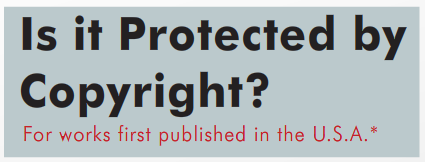 This awesome ‘Digital Copyright Slider‘ has been developed by the American Library Association as an easy reference to find out whether a work is protected by copyright.
This awesome ‘Digital Copyright Slider‘ has been developed by the American Library Association as an easy reference to find out whether a work is protected by copyright.
By setting the arrow on the date of the work’s publication, you can find out whether the work is in the public domain, whether it was registered when copyright registration was required before 1989, and where to find more information about tracking down copyright owners to request permission.
The Copyright Advisory Network site, where the tool is hosted, seems to be an amazing repository of news and analysis by the library community in the United States. According to the site, its purpose ‘is to encourage librarians to discuss copyright concerns and seek feedback and advice from fellow librarians and copyright specialists.’
It would be awesome to build a similar slider for South Africa. And since the ALA has licensed their tool under a CC BY-NC-SA license, anyone can do just that!
Living Heritage – The Haka February 12, 2009
Posted by Rebecca Kahn in Features.Tags: heritage, New Zealand, traditional knowledge
6 comments
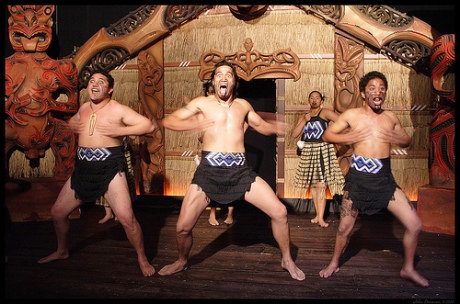
There’s a great article in The Guardian today about the haka, the traditional Maori ritual that anyone who watches rugby (or bad TV ads) is familiar with.
The eye-rolling, grimacing dance is an important part of Maori culture, and has been incorporated into the culture in New Zealand and the rest of the world. But, according to the article, it’s been used in various culturally insensitive ways, which has angered and upset traditional leaders in the Maori community in New Zealand.
So the good news is that the New Zealand government has assigned intellectual property rights in the traditional Maori haka, or the Ka Mate, to Ngati Toa, a North Island tribal group. This in itself is great news but what’s even more important is the understanding from both the government and the Ngati Toa that this is not a decision that has been made around money, which is so often the lurking agenda behind decisions in the Traditional Knowledge sphere.
The agreement states that:
“Ngati Toa’s primary objective is to prevent the misappropriation and culturally inappropriate use of the Ka Mate haka,”
And the article goes to to say that:
“…while the tribe has tried several times to trademark the haka, it has failed, mainly becuase of concerns that it might charge the All Blacks for performing it. However, John Key, New Zealand’s prime minister, said the issue was cultural redress and not money. If a company wanted to use the haka for commercial reasons there should be a recognition of the tribe’s cultural interests. How this would be handled in the final treaty settlement was still a matter of discussion, he told the New Zealand Herald.”
This is, I think, a really good example of how the tensions between groups in countries that have a history of colonisation can be addressed in a way that preserves traditional culture and heritage, not just for the ethnic groups where the traditions originated, but also for the groups who have appropriated this culture for themselves. Ideas of ownership in the TK arena need not be an “us” and “them” scenario – but rather an agreement on the collective nature of heritage, with an acknowledgement of where the culture originated.
Pic: Kiwi Haka by Jad_23 on Flickr, CC BY-NC-ND 2.0
